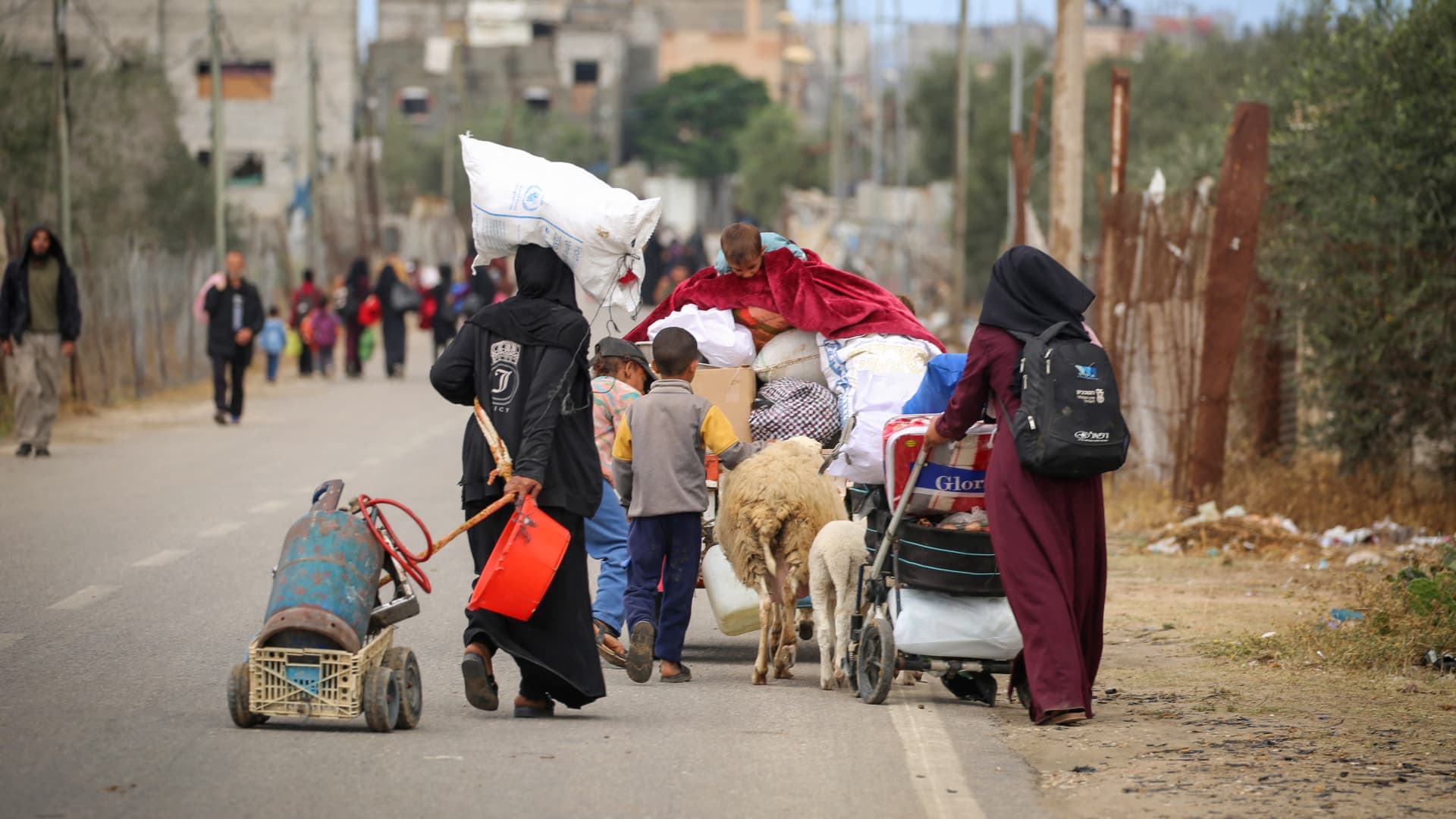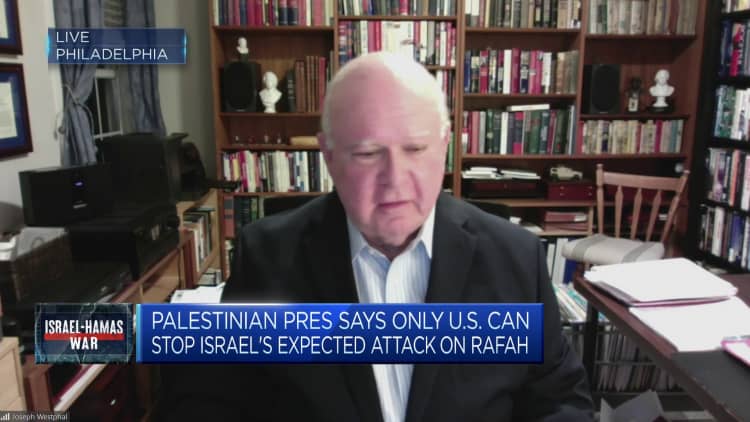
Displaced Palestinians in Rafah in the southern Gaza Strip sit alongside their belonging in the back of a vehicle as they leave following an evacuation order by the Israeli army on May 6, 2024, amid the ongoing conflict between Israel and the Palestinian Hamas movement.
– | Afp | Getty Images
Israel’s military on Monday said it has begun evacuating Palestinians from parts of Gaza’s southern city of Rafah, ahead of an expected military operation where roughly half of the enclave’s entire population is sheltering.
“For your safety, the IDF appeals to you evacuate immediately to the expanded humanitarian area in Al-Mawasi,” Avichay Adraee, the Israel Defense Force’s head of the Arab media division, wrote in a post on X, according to a Google translation from Arabic.
“The IDF will act with extreme force against terrorist organizations in your areas of residence, as it has done so far. Anyone who is close to terrorist organizations puts his life and the life of his family at risk,” the post said.
Al Mawasi is a small stretch of coastal scrub land, just over half a mile wide and 8.6 miles long, and is already host to several hundred thousand displaced Palestinians. More than 1.2 million people are currently sheltering in Rafah, most of whom fled other parts of the Gaza Strip, predominantly living in tents and without access to sufficient water, food, and basic medicine.
A Palestinian girl sits holding a toddler on a sand dune overlooking a camp for displaced people in Rafah in the southern Gaza Strip on March 17, 2024, amid ongoing battles between Israel and the militant group Hamas.
Mohammed Abed | Afp | Getty Images
The White House — as well as the United Nations, WHO and other multinational organizations — has urged Israel against an offensive in Rafah, warning of catastrophic humanitarian consequences. Israeli President Benjamin Netanyahu said that an operation there is essential to his country winning the war against Hamas.
‘Total victory’
Netanyahu and his far-right governing coalition have rejected Washington’s supplications, saying that Israel would conduct its offensive into Rafah with or without U.S. support.
“The idea that we will halt the war before achieving all of its goals is out of the question. We will enter Rafah and we will eliminate the Hamas battalions there – with or without a [cease-fire] deal, in order to achieve total victory,” Netanyahu said while speaking in Jerusalem on Tuesday.
Israeli Prime Minister Benjamin Netanyahu (2nd R) meets with soldiers stationed near the north of Gaza Strip in Jerusalem on December 25, 2023.
Avi Ohayon | Anadolu | Getty Images
The IDF believes that between 5,000 and 8,000 Hamas fighters are in the densely-populated southern city, which it says is the militant group’s last holdout.
The announcement Monday comes after the latest round of hostage and cease-fire deal negotiations ended in Cairo on Sunday, with both Hamas and Israeli officials trading blame for the talks’ collapse.
Israeli Defense Minister Yoav Gallant said on Sunday that “we see signs that Hamas does not intend to go to any agreement.” Israel did not send a delegation to Cairo for the discussions, which were mediated by Qatar and Egypt.
Hamas has proposed releasing a number of hostages in exchange for a full and permanent cease-fire, which Israel’s government said is a no-go, as it aims aim to continue its military offensive in Gaza until it deems the group to be completely eliminated. The Hamas delegation left Egypt on Sunday for Qatar, where it has a political office, saying that “in-depth and serious discussions took place” in the last several days. It will return to Cairo on Tuesday to continue talks.

CIA Director William Burns was in the Qatari capital of Doha on Sunday for discussions with top officials in an attempt to keep the talks alive and is likely to travel to Israel for more cease-fire and hostage release talks, NBC News reported, citing a source with knowledge of the matter.
Israel on Sunday closed the Kerem Shalom border crossing, a vital conduit of humanitarian aid into Gaza, after it was hit by at least 10 rockets that morning. Hamas claimed responsibility for the attack, which killed four IDF soldiers.
‘Apocalyptic conditions’
In the seven months since the Israel-Hamas war began, Rafah has become one of the most crowded places on Earth, according to aid organizations.
A Palestinian woman cries as she inspects a heavily damaged apartment following Israeli bombardment on Rafah in the southern Gaza Strip on February 8, 2024, as the conflict between Israel and Hamas enters its fifth month.
Said Khatib | Afp | Getty Images
One of those organizations, Islamic Relief, described “apocalyptic conditions,” and said that “civilians there are terrified about the coming days.”
An invasion of the area “would inevitably kill thousands more civilians, uproot hundreds of thousands of people yet again, and make widespread famine inevitable,” and “would massively disrupt the humanitarian response across Gaza, which is primarily based in Rafah, at a time when lifesaving aid is needed more than ever,” the group wrote in a press release from May 2.
Mohammed Al Najjar, a 23-year-old blind law student from Gaza, is currently living in Rafah with his parents. He spoke to CNBC about his family’s fear of what may be to come.
“We woke up this morning to see pamphlets outside the house telling us to evacuate the area we’re in. The evacuation order told us to go to Khan Yunis and Northern Deir Al Balah because the Israeli army designated them safe zones,” Al Najjar said.
Displaced Palestinians collect food donated by a charity before an iftar meal, the breaking of the fast, on the first day of the Muslim holy fasting month of Ramadan in Rafah, on the southern Gaza Strip on March 11, 2024, amid ongoing battles between Israel and the militant group Hamas.
– | Afp | Getty Images
“The areas the Israeli army mentioned that are safe zones are overcrowded and have thousands of people there with no space and no food. Right now, my parents and I are deciding on what to do. We don’t know what will happen. There is a lot of stress and panic.”
Al Najjar was studying for a master’s degree in public law at the Islamic University of Gaza when the war broke out. The university was bombed by Israeli forces on Oct. 13, who alleged it was being used as a training and weapons production facility for Hamas. CNBC could not independently verify the IDF’s claims.
“If we stay in our home, we will get bombed, and if we leave there might not be any room for us in Deir Al Balah or Khan Yunis,” Al Najjar said, communicating via Whatsapp voice notes as his signal was not strong enough to hold a call.
“At any moment our phones could be cut off from the world, and no one will know what happens to us.”
— CNBC’s Dalya Al Masri contributed to this report.
